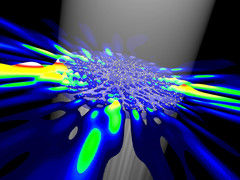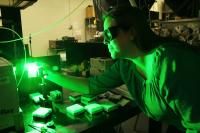Control scheme dynamically maintains unstable quantum system
A simple pendulum has two equilibrium points: hanging in the "down" position and perfectly inverted in the "up" position. While the "down" position is a stable equilibrium, the inverted position is definitely not stable. Any infinitesimal deviation from perfectly inverted is enough to cause the pendulum to eventually swing down.
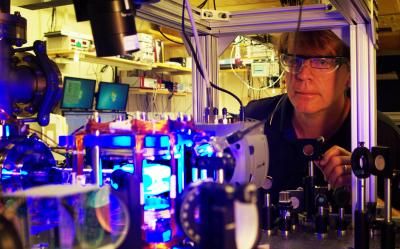
Georgia Tech professor Michael Chapman poses with laser equipment in his laboratory. Georgia Tech researchers have demonstrated a way to maintain an unstable quantum system by applying bursts of microwave radiation.
Georgia Tech, John Toon
It has been known for more than 100 years, though, that an inverted pendulum can be stabilized by vibrating the pivot point. This non-intuitive phenomenon is known as dynamic stabilization, and it has led to a broad range of applications including charged particle traps, mass spectrometers and high-energy particle accelerators.
Many-body quantum systems can also be placed into unstable non-equilibrium states, and like the inverted pendulum of classical physics, they typically evolve away from these states. Now, researchers at the Georgia Institute of Technology have demonstrated a way to maintain an unstable quantum system by applying bursts of microwave radiation – a quantum analog to vibrating the inverted pendulum.
In an experiment that could have implications for quantum computers and quantum simulators, the researchers used microwave pulses of varying amplitudes and frequencies to control a quantum system composed of a cloud of approximately 40,000 rubidium atoms cooled nearly to absolute zero.
The research, sponsored by the National Science Foundation and reported online by the journal Physical Review Letters, experimentally demonstrated dynamical stabilization of a non-equilibrium many-body quantum system.
"In this work, we have demonstrated that we can control the quantum dynamics of a cloud of atoms to maintain them in a non-equilibrium configuration analogous to the inverted pendulum," said Michael Chapman, a professor in the Georgia Tech School of Physics. "What we actually control is the internal spins of the atoms that give each atom a small magnetic moment. The spins are oriented in an external magnetic field against their will such that they would prefer to flip their orientation to the equilibrium position."
Mathematically, the state of the rubidium atoms is virtually identical to that of the simple mechanical pendulum, meaning that Chapman and his students have controlled what could be called a "quantum inverted pendulum."
In their experiment, the researchers began with a spin-1 atomic Bose-Einstein condensate (BEC) that is initialized in an unstable, fixed point of the spin-nematic phase space – comparable to an inverted pendulum. If allowed to freely evolve, interactions between the atoms would give rise to squeezing, quantum spin mixing and eventually relaxation to a stable state – comparable to a pendulum hanging straight down from a pivot point.
By periodically applying bursts of microwave radiation, the researchers rotated the spin-nematic many-body fluctuations, halting the squeezing and the relaxation toward stability. The researchers investigated a range of pulse periods and phase shifts to map a stability diagram that compares well with what they expected theoretically.
"The net effect is that the many-body system basically returns to the original state," said Chapman. "We reverse the squeezing of the condensate, and after it again evolves toward squeezing, we cause it to return. If we do this periodically, we can maintain the Bose-Einstein condensate in this unstable point indefinitely."
The control technique differs from active feedback, which measures the direction in which a system is moving and applies a force counter to that direction. The open-loop technique used by Chapman's group applies a constant input that doesn't vary with the activity of the system being controlled.
"We are periodically kicking the system to keep it in a state where it doesn't want to be," he said. "This is the first time we have been able to make a many-body spin system that we can stabilize against its natural evolution."
Controlling and manipulating single-particle quantum systems or simple collections of atoms, electrons and photons has been a focus of the physics community over recent decades. These capabilities have formed the foundation for technologies such as lasers, magnetic resonance imaging, atomic clocks and new atomic sensors for magnetic fields and inertial guidance.
Now, researchers are studying more complex systems that involve many additional interacting particles, perhaps thousands of them. Chapman and his group hope to help extend their knowledge of these more complex many-body systems, which could lead to developments in quantum computing, quantum simulations and improved measurements.
"The long-range goal of our work is to further the understanding of quantum mechanics and to develop new technologies that exploit the often counterintuitive realities of the quantum world," Chapman said. "Quantum many-body systems are being actively explored, and one of the things you'd like to do is be able to control them. I think this is one of the cleanest examples of being able to control a quantum many-body system in a manifestly unstable configuration."
Topics
Organizations
Other news from the department science
These products might interest you

isoprime precisION by Elementar Analysensysteme
isoprime precisION stable isotope ratio mass spectrometer
The most flexible, yet powerful isotope ratio mass spectrometer ever created
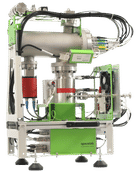
IonTamer ToF MS by Spacetek Technology
IonTamer instruments are time-of-flight residual gas analysers (TOF-RGA) for the analysis of gases
Compact Time-of-flight residual gas analyzer (TOF-RGA) for process analysis
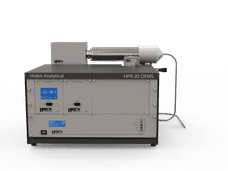
HPR-20 OEMS, Online Electrochemical Mass Spectrometer by Hiden Analytical
Online monitoring and quantification of evolved gases and vapours from electrochemical processes
A complete gas analysis solution, designed to integrate seamlessly with electrochemical applications
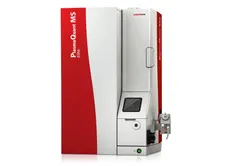
PlasmaQuant MS Elite by Analytik Jena
LC-ICP-MS Is the Key to the World of Elemental Species
Highest Sensitivity and Lowest Detection Limits with PlasmaQuant MS Series and PQ LC

BIOS ANALYTIQUE - Soluciones de Renting y Leasing para laboratorios by Bios Analytique
Specialists in the rental and leasing of scientific equipment for laboratories throughout Europe
Whether you have an unexpected requirement or limited budget, we have the perfect solution for you
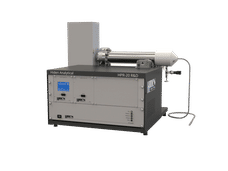
HPR-20 R&D by Hiden Analytical
A specialist benchtop triple filter mass spectrometer for the monitoring of evolved gases & vapours
Providing improved resolution & abundance sensitivity with an ultimate detection limit of 5 ppb sub

Xevo TQ Absolute by Waters
A new Tandem Quadrupole Mass Spectrometer for Quantification with Absolute power
Absolute performance, efficiency, productivity, and confidence for your most challenging compounds
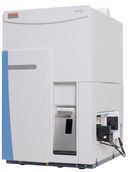
iCAP TQ Triple Quadrupole ICP-MS by Thermo Fisher Scientific
Overcome unexpected interferences, reduce detection limits and improve data quality
Ultralow limits of detection with simplicity - even for the most challenging analytical applications

iCAP RQ single Quadrupole ICP-MS by Thermo Fisher Scientific
Robust ICP-MS with ease of use and high productivity for routine analysis
A complete multi-element analysis solution for your high-throughput routine laboratory

NexION® 5000 by PerkinElmer
NexION 5000 Multi-Quadrupole ICP Mass Spectrometer
NexION 5000 Multi-Quadrupole ICP Mass Spectrometer

expression® Compact Mass Spectrometer by Advion Interchim Scientific
Mass Spectrometry for Chemists: Fast, Easy, Prep-Free Reaction Monitoring at the Bench
Featuring a variety of sample introduction techniques that also allow TLC/MS & direct probe analysis

Thermo Scientific TSQ Triple Quadrupole Mass Spectrometry Systems by Thermo Fisher Scientific
Confident quantitation with triple quadrupole LC-MS systems
Mass Spectrometry Systems
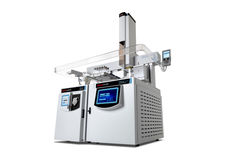
TSQ 9610 GC-MS/MS by Thermo Fisher Scientific
TSQ 9610 GC-MS/MS for superb sensitivity and selectivity with outstanding reliable productivity
Eliminate unnecessary, unplanned instrument downtime, save helium and maximize productivity

Get the chemical industry in your inbox
By submitting this form you agree that LUMITOS AG will send you the newsletter(s) selected above by email. Your data will not be passed on to third parties. Your data will be stored and processed in accordance with our data protection regulations. LUMITOS may contact you by email for the purpose of advertising or market and opinion surveys. You can revoke your consent at any time without giving reasons to LUMITOS AG, Ernst-Augustin-Str. 2, 12489 Berlin, Germany or by e-mail at revoke@lumitos.com with effect for the future. In addition, each email contains a link to unsubscribe from the corresponding newsletter.
Most read news
More news from our other portals
See the theme worlds for related content
Topic World Mass Spectrometry
Mass spectrometry enables us to detect and identify molecules and reveal their structure. Whether in chemistry, biochemistry or forensics - mass spectrometry opens up unexpected insights into the composition of our world. Immerse yourself in the fascinating world of mass spectrometry!

Topic World Mass Spectrometry
Mass spectrometry enables us to detect and identify molecules and reveal their structure. Whether in chemistry, biochemistry or forensics - mass spectrometry opens up unexpected insights into the composition of our world. Immerse yourself in the fascinating world of mass spectrometry!
Topic world Sensor technology
Sensor technology has revolutionized the chemical industry by providing accurate, timely and reliable data across a wide range of processes. From monitoring critical parameters in production lines to early detection of potential malfunctions or hazards, sensors are the silent sentinels that ensure quality, efficiency and safety.

Topic world Sensor technology
Sensor technology has revolutionized the chemical industry by providing accurate, timely and reliable data across a wide range of processes. From monitoring critical parameters in production lines to early detection of potential malfunctions or hazards, sensors are the silent sentinels that ensure quality, efficiency and safety.
